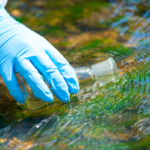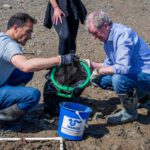Ofwat and the EA must go further: Lords’ report on sewage pollution welcomed by...
How might the water industry be better regulated to reduce the sewage pollution that floods waterways in England and Wales? A report from the...
CIP micropollutants research published by UKWIR
Thirteen research reports have just been published, which aim to boost the water sector’s knowledge of microplastics and further the understanding of anti-microbial resistance...
Prioritise tackling toxic emissions from tyres, urge experts
A new briefing paper from Imperial College London attempts a deep dive on the pollution produced by the particles sloughed off from vehicle tyres....
Cloud computing: Ohio derailment damage appraisal grapples with conflicting accounts
As details of its spilled cargo have come gradually to light, the Ohio train derailment has elicited “worst of all time” pronouncements, and a...
Can better monitoring and testing help to tackle nitrogen pollution?
By Dr Calum Preece
Improving the monitoring and mitigation of major pollution trends is one of the most important areas of environmental research. It is...
New initiative aims to use Earth observation and geospatial data to detect sewage spills
Ordnance Survey is working with consultancy firm CGI to investigate the possibilities of using Earth observation data to detect sewage from space. Launched by...
Project uses satellite data to detect waste sites on Earth
A new computational system uses satellite data to identify sites on land where people dispose of waste, providing a new tool to monitor waste...
Eating one freshwater fish equals a month of drinking ‘forever chemicals’ water, says US...
A new study appears to find that consumption of just a single serving of freshwater fish per year could be equal to a month...
Against the grain: What can be done about microplastics in soils and digestate?
Microplastics are everywhere: We know that much. But should we be worried? What can we do about it? Some of the speakers at Aqua Enviro's European Biosolids and Bioresources Conference, in late November, presented findings from a project aiming to understand the levels of this contaminant in compost and AD digestate. A change in the policy landscape seems imminent, as Envirotec found out.
Sponsored Content: Trials show new PFAS adsorbent outperforms current methods
Trials have been undertaken by two independent institutions, using a next generation PFAS adsorbent media developed by Puraffinity, the London based science materials company.
Dangers and opportunities of digital transformation explored at British Water Data Conference
The sixth British Water Data Conference, which took place on 3 November 2022, kicked off with a warning from keynote speaker Oliver Grieveson on...
Ocean appointment: Fukushima water discharge facilities under construction
A coastal facility will dilute and release wastewater from the former nuclear plant at Fukushima Daiichi, beginning in Spring 2023. Not all dangerous isotopes will be removed, notably Tritium.
Call for Thames Water to make swift upgrades to Cassington sewage works after Wolvercote...
Oxford-based Wolvercote Mill Stream - the only official swimming spot on the Thames – has failed bacteria safety tests. Environmental charity Thames21 has warned...
Complaint launched after government misses legal deadline on environmental protections
On 1 November green groups submitted a letter of complaint to Defra after the Government failed to meet a legal deadline on setting new...
Microplastics: Six surprising everyday things that contain and release them
Microplastics have become so widespread that they have been discovered in fresh Antarctic snow. They enter the environment in all kinds of ways, not...
New measures and research needed to tackle ecological impact of pharmaceuticals
A group of international researchers has issued a warning about the increase in pharmaceutical contamination in the environment, with suggestions about how it might...
Fracking vs local democracy: The struggle continues
The government’s lifting of the moratorium on fracking on 22 September was accompanied by assurances that it would only take place where there was...
Call for government to make swift decision on ban on plastic in wet wipes
The government needs to make an immediate decision on banning plastic in wet wipes in order to help tackle this sewage-based pollution ending up...
As winters warm, nutrient pollution threatens 40% of US
A first-of-its-kind national study appears to find that previously frozen winter nutrient pollution — unlocked by rising winter temperatures and rainfall — is putting...
Washing machine filter captures microplastic without the need for disposables
Bristol based microplastic technology company Matter is launching Gulp, "the first sustainable, long-lasting washing machine microfibre filter" on Kickstarter from 11 October.
The firm develops...






















